

Jediism. Jedi sticker in 2007.
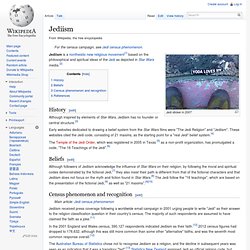
Unitarian Universalism. Unitarian Universalism[2][3][4] is a liberal religion characterized by a "free and responsible search for truth and meaning".[5][6] Unitarian Universalists do not share a creed but are unified by their shared search for spiritual growth.
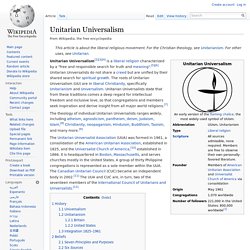
The roots of Unitarian Universalism (UU) are in liberal Christianity, specifically Unitarianism and Universalism. Unitarian Universalists state that from these traditions comes a deep regard for intellectual freedom and inclusive love, so that congregations and members seek inspiration and derive insight from all major world religions.[7] Secular humanism. The philosophy or life stance of secular humanism (alternatively known by some adherents as Humanism, specifically with a capital H to distinguish it from other forms of humanism) embraces human reason, ethics, and philosophical naturalism while specifically rejecting religious dogma, supernaturalism, pseudoscience, and superstition as the basis of morality and decision making.[1][2][3][4] The International Humanist and Ethical Union (IHEU) is the world union of more than one hundred Humanist, rationalist, irreligious, atheistic, Bright, secular, Ethical Culture, and freethought organizations in more than 40 countries.
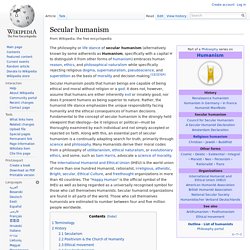
The "Happy Human" is the official symbol of the IHEU as well as being regarded as a universally recognised symbol for those who call themselves Humanists. Secular humanist organizations are found in all parts of the world. Those who call themselves humanists are estimated to number between four and five million people worldwide. Universal Life Church. The ULC's stated beliefs are as follows: Objective: Eternal Progression.Goal: A Fuller Life for Everyone.Slogan: To Live and Help Live.Maxim: "We Are One.
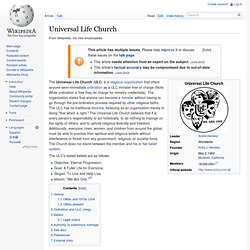
"[2] History[edit] Founded under the name "Life Church" in 1959 by the Reverend Kirby J. Subud. Subud (pronounced [ˈsʊbʊd]) is an international spiritual movement that began in Indonesia in the 1920s, founded by Muhammad Subuh Sumohadiwidjojo.
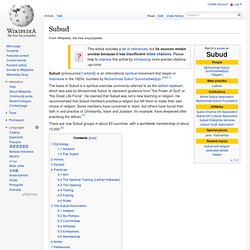
[note 1] The basis of Subud is a spiritual exercise commonly referred to as the latihan kejiwaan, which was said by Muhammad Subuh to represent guidance from "the Power of God" or "the Great Life Force". He claimed that Subud was not a new teaching or religion. He recommended that Subud members practise a religion but left them to make their own choice of religion. List of religions and spiritual traditions. Religious symbols in clock-wise order: Judaism, Christianity, Islam, Baha'i, Hinduism, Taoism, Buddhism, Sikhism, Rodnoveri, Celtic pagan, Heathenism, Semitic pagan, Wicca, Kemetism, Hellenic pagan, Roman pagan.
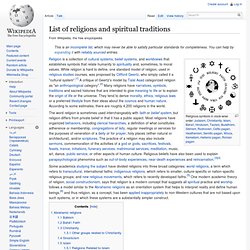
Abrahamic religions[edit] Scientology. Scientology is a body of beliefs and related practices created by science fiction writer L.
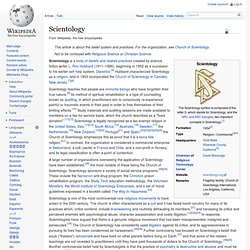
Ron Hubbard (1911–1986), beginning in 1952 as a successor to his earlier self-help system, Dianetics.[6] Hubbard characterized Scientology as a religion, and in 1953 incorporated the Church of Scientology in Camden, New Jersey.[7][8] A large number of organizations overseeing the application of Scientology have been established,[28] the most notable of these being the Church of Scientology. Scientology sponsors a variety of social-service programs.[28][29] These include the Narconon anti-drug program, the Criminon prison rehabilitation program, the Study Tech education methodology, the Volunteer Ministers, the World Institute of Scientology Enterprises, and a set of moral guidelines expressed in a booklet called The Way to Happiness.[30] Scientology is one of the most controversial new religious movements to have arisen in the 20th century.
Etymology and earlier usage History Dianetics L. Pantheism. Pantheism is the belief that the universe (or nature as the totality of everything) is identical with divinity,[1] or that everything composes an all-encompassing, immanent God.[2] Pantheists thus do not believe in a distinct personal or anthropomorphic god.[3] Some Eastern religions are considered to be pantheistically inclined.
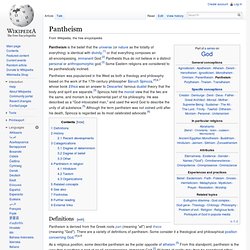
Definitions[edit] Pantheism is derived from the Greek roots pan (meaning "all") and theos (meaning "God"). There are a variety of definitions of pantheism. Some consider it a theological and philosophical position concerning God.[4]:p.8. Naturalistic pantheism. Naturalistic pantheism is a phrase referring to a kind of pantheism, and has been used in various ways.
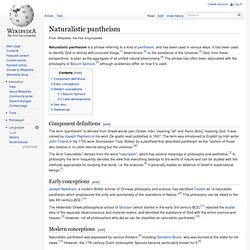
It has been used to identify God or divinity with concrete things,[1] determinism,[2] or the substance of the Universe.[3] God, from these perspectives, is seen as the aggregate of all unified natural phenomena.[4] The phrase has often been associated with the philosophy of Baruch Spinoza,[5] although academics differ on how it is used. Component definitions[edit] The term “pantheism" is derived from Greek words pan (Greek: πᾶν) meaning "all" and theos (θεός) meaning God. It was coined by Joseph Raphson in his work De spatio reali, published in 1697. The term was introduced to English by Irish writer John Toland in his 1705 work Socinianism Truly Stated, by a pantheist that described pantheism as the "opinion of those who believe in no other eternal being but the universe Early conceptions[edit] Meher Baba.
Meher Baba (25 February 1894 – 31 January 1969), born Merwan Sheriar Irani, was an Indian spiritual master who said he was the Avatar,[1] God in human form.[2] Merwan Sheriar Irani was born in 1894 in Pune, India to Zoroastrian parents.
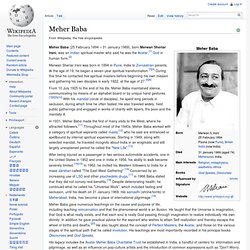
At the age of 19, he began a seven-year spiritual transformation.[3][4] During this time he contacted five spiritual masters before beginning his own mission and gathering his own disciples in early 1922, at the age of 27.[5][6] From 10 July 1925 to the end of his life, Meher Baba maintained silence, communicating by means of an alphabet board or by unique hand gestures.[7][8][9][10] With his mandali (circle of disciples), he spent long periods in seclusion, during which time he often fasted. Juche. Juche (sometimes spelled Chuch'e; Chosŏn'gŭl: 주체; hancha: 主體; Korean pronunciation: [tɕutɕʰe]), literally "self-reliance", sometimes referred to as Kimilsungism or Kimilsungism–Kimjongilism, is a political thesis formed by the former North Korean leader Kim Il-sung which states that the Korean masses are the masters of the country's development.
From the 1950s to the 1970s, Kim and other party theorists such as Hwang Jang-yop elaborated the Juche Idea into a set of principles that the government uses to justify its policy decisions. Among these are a strong military posture and reliance on Korean national resources. Juche has been accused of being a form of political religion despite North Korea's formal commitment to state atheism. Jediism. Humanism. In modern times, humanist movements are typically aligned with secularism, and today "Humanism" typically refers to a non-theistic life stance centred on human agency, and looking to science instead of religious dogma in order to understand the world.[2] Background The word "Humanism" is ultimately derived from the Latin concept humanitas, and, like most other words ending in -ism, entered English in the nineteenth century.
However, historians agree that the concept predates the label invented to describe it, encompassing the various meanings ascribed to humanitas, which included both benevolence toward one's fellow humans and the values imparted by bonae litterae or humane learning (literally "good letters"). Fourth Way. According to this system, the chief difference between the three traditional schools, or ways, and the fourth way is that "they are permanent forms which have survived throughout history mostly unchanged, and are based on religion.
Where schools of yogis, monks or fakirs exist, they are barely distinguishable from religious schools. The fourth way differs in that it is not a permanent way. It has no specific forms or institutions and comes and goes controlled by some particular laws of its own. " Ethical movement. Ethical Culture is premised on the idea that honoring and living in accordance with ethical principles is central to what it takes to live meaningful and fulfilling lives, and to creating a world that is good for all. Practitioners of Ethical Culture focus on supporting one another in becoming better people, and on doing good in the world.[2][3] The American Ethical Union is a federation of about 25 Ethical Societies in the United States, representing the Ethical Culture movement. It is one of the founding member organizations of the International Humanist and Ethical Union. Brooklyn Society for Ethical Culture building on Prospect Park West, originally designed by architect William Tubby as a home for William H.
Childs (inventor of Bon Ami Cleaning Powder) Eckankar. The Eckankar "EK" symbol. Discordianism. "Sacred Chao" redirects here. For the German thrash metal band by that name, see Living Death. Deism. Deism (